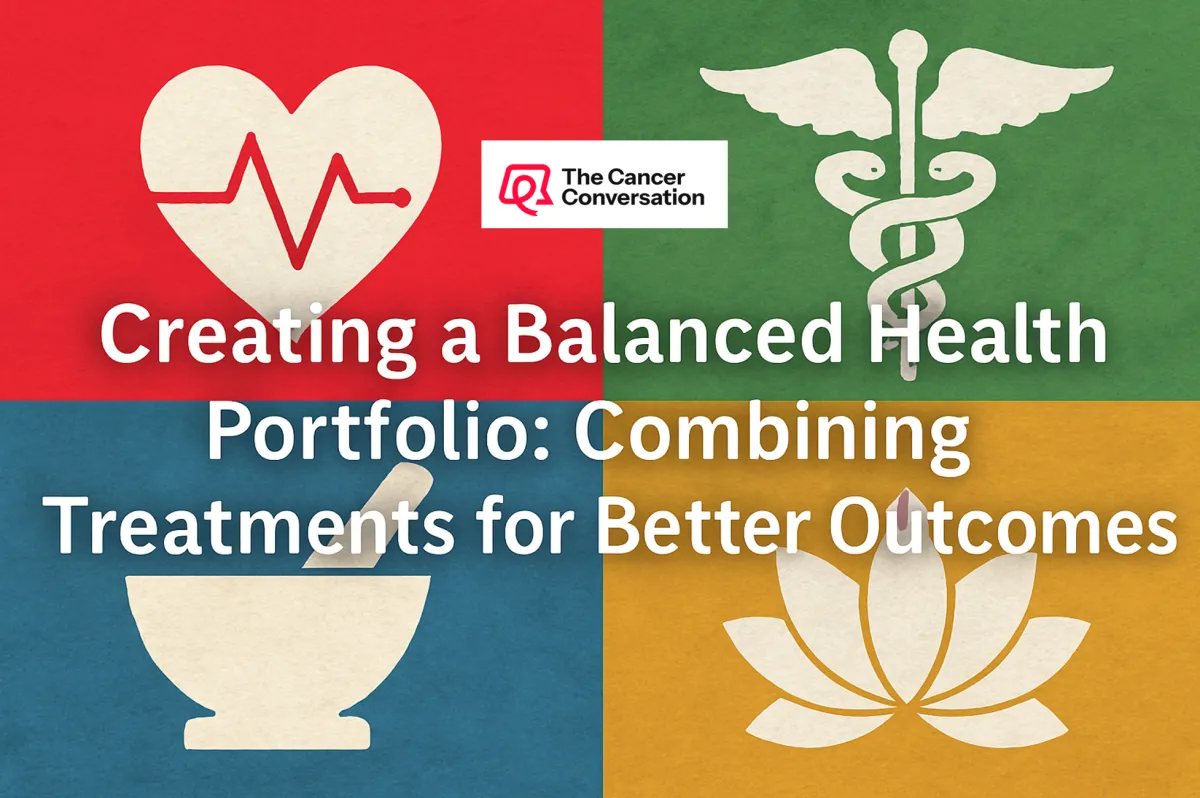
Creating a Balanced Health Portfolio: Combining Treatments for Better Outcomes
Navigating a cancer diagnosis can feel overwhelming, but embracing a balanced health portfolio that combines both natural and conventional treatments offers hope and empowerment. By integrating holistic cancer treatment options alongside traditional methods, individuals can enhance their health outcomes and foster a sense of control over their journey. Mind-body wellness plays a crucial role in this approach, helping to manage stress and promote healing from within. With the support of a trusted advisor and a community of caregivers, building an integrative health strategy becomes a shared endeavor. Explore how a well-rounded approach to cancer recovery can be the key to resilience and strength. 🌿✨ Learn more about balanced health portfolios.## Integrating Treatments for Cancer Recovery
In the journey of cancer recovery, integrating various treatment approaches can provide a more comprehensive healing experience. By combining conventional therapies with natural methods, patients can create a balanced health portfolio that addresses both physical and emotional needs. This integration not only enhances the effectiveness of treatments but also empowers individuals to take an active role in their recovery.
Blending Conventional and Natural Approaches
Conventional treatments, such as chemotherapy and radiation, are the backbone of cancer care. These therapies target cancer cells directly, aiming to eliminate or control their growth. Natural approaches, including nutritional support, herbal remedies, and acupuncture, focus on boosting the body's natural defenses and improving overall well-being.
Understand the benefits of each treatment type. Conventional methods are often necessary for aggressive cancers, while natural treatments can help mitigate side effects.
Consult with healthcare providers about how to safely combine these modalities.
Monitor and adjust the treatment plan based on the patient's response.
For example, Helen, a breast cancer survivor, combined chemotherapy with yoga and dietary changes. This holistic approach helped her manage nausea and fatigue more effectively.
For more information, explore these resources:
Benefits of a Balanced Health Portfolio
A balanced health portfolio offers multiple benefits for cancer patients. Physical health improves as treatments work in synergy, addressing various aspects of the disease and its side effects. Patients often report feeling more energetic and resilient due to this holistic approach.
Emotional well-being also sees a boost. By incorporating mind-body practices such as meditation or tai chi, patients can reduce stress and improve their mental outlook. This emotional support is crucial for maintaining motivation and hope throughout the cancer journey.
To illustrate, a study showed that patients who combined mindfulness practices with medical treatments had better outcomes and lower stress levels (source).
The Role of Mind-Body Wellness
Mind-body wellness is a cornerstone of integrative health, providing essential tools for managing the emotional and physical challenges of cancer. By focusing on the connection between mind and body, patients can harness inner resources to aid their healing process.
Managing Stress and Promoting Healing
Stress management is critical during cancer treatment. High stress levels can weaken the immune system, hindering recovery. Techniques such as deep breathing, progressive muscle relaxation, and guided imagery can help patients manage stress effectively.
Practice regularly to maintain a calm mental state.
Incorporate activities like yoga and meditation into daily routines.
Utilize resources such as support groups and wellness workshops.
Consider the story of Mark, who practiced daily meditation to cope with anxiety during radiation therapy. His consistent practice significantly improved his treatment experience.
Building Resilience and Inner Strength
Resilience is the ability to bounce back from challenges, and building it can be transformative for cancer patients. Activities like journaling, gratitude exercises, and positive visualization can foster a resilient mindset.
Journaling helps process emotions and track progress.
Gratitude exercises shift focus to positive aspects of life.
Visualization creates a mental image of health and wellness.
According to a study, patients who engaged in regular mind-body practices reported higher levels of resilience and overall satisfaction with their treatment (source).
Support Systems and Community
Support systems play an integral role in cancer recovery. A strong community of caregivers and health advisors can provide invaluable assistance, making the complex journey more manageable and less isolating.
Collaborating with Trusted Health Advisors
Working with trusted health advisors ensures that patients receive personalized care tailored to their needs. Collaborative efforts between oncologists, nutritionists, and holistic practitioners lead to more comprehensive treatment plans.
Discuss all treatment options with advisors.
Ensure all team members are informed about the patient's overall health strategy.
Regularly review progress and adjust plans as necessary.
The expertise of health advisors like Dr. Maria, who integrates nutrition and conventional treatments, has been pivotal for many patients.
Empowering Through Caregiver Support 🌟💪
Caregivers provide emotional and practical support, which is crucial for a patient's well-being. Encouraging caregivers to engage in self-care and education enhances their ability to support effectively.
Caregiver tips:
Attend appointments to gain a better understanding of treatments.
Participate in support groups to connect with others in similar roles.
Practice self-care to maintain personal health and energy levels.
For instance, Jane, a caregiver, found strength in joining a community group, which provided her with resources and emotional support. This empowerment significantly affected her ability to care for her husband.
Access further reading here:







